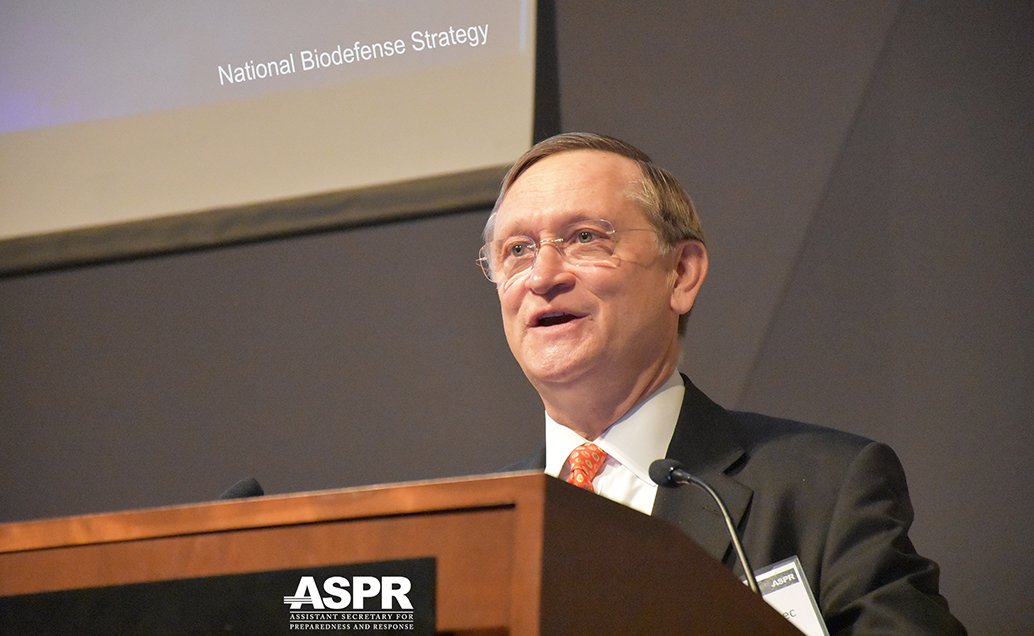
Dr. Robert Kadlec, Assistant Secretary for Preparedness and Response (ASPR), on Wednesday confirmed his duties as the top emergency preparedness official coordinating the COVID-19 coronavirus response from both the U.S. Department of Health and Human Services (HHS) and the federal government.
“As far as my role in this activity at this point in time, I have four principle functions,” Kadlec told members of the U.S. House Oversight and Reform Committee earlier today during its hearing entitled: Coronavirus Preparedness and Response.
“My first and foremost responsibility as we transition from containment of this disease to a hybrid approach and strategy of containment and mitigation is to be incident management for the Secretary of Health and Human Services to ensure that we have a unified, coordinated and synchronized effort across HHS and across the U.S. government consistent with the National Response Framework for Emergency Support Function No. 8 for medical and public health preparedness and response,” said Kadlec.
Regarding Emergency Support Function No. 8, or ESF #8, Kadlec was referencing the Public Health and Medical Services Annex, which is coordinated by HHS to provide aligned federal assistance to supplement state, tribal and local resources in response to a public health and medical disaster; potential or actual incidents requiring a coordinated federal response; and/or during a developing potential health and medical emergency.
Such assistance may include responding to medical needs associated with mental health, behavioral health and substance abuse considerations of incident victims and response workers.
Services also cover the medical needs of members of the “at risk” or “special needs” population described in the Pandemic and All-Hazards Preparedness Act and in the National Response Framework glossary, and includes a population whose members may have medical and other functional needs before, during and after an incident, according to HHS.
Secondly, Kadlec testified, he also supports the nation’s healthcare system through the Hospital Preparedness Program and the country’s regional disaster response network.
Thirdly, Kadlec said he works with the National Institutes of Health, the Food and Drug Administration and colleagues from the U.S. Department of Defense “to rapidly develop and accelerate the development of therapeutics, diagnostics and vaccines that could be used in this outbreak.”
Finally, according to the ASPR, he provides direct support to state and local entities.
For example, Kadlec said that during the current incident involving the Grand Princess cruise ship that’s docked in Oakland, Calif., “we’re working directly with the State of California, the City of Oakland, and with our interagency partners to safely disembark all of those passengers, American and non-American, and manage the crew to ensure they can safely return to their homes, but more importantly, protecting the communities that will be receiving these individuals.”
The Grand Princess cruise ship today continued disembarking passengers for a third day after those aboard the ship anxiously awaited word last week about whether they could leave the ship after coronavirus cases were discovered on board March 5.
Thus far, roughly 1,400 people have disembarked the ship, with another 1,000 people still on board, according to HHS.
Some of those who left the ship were treated and released at area hospitals, while others will be sent to several local hotels to spend their 14-day quarantine. Still others will be flown or bused to military bases in California, Texas and Georgia.
An HHS spokesperson also confirmed Kadlec’s responsibilities to Homeland Preparedness News in an email on Tuesday.
“As we continue to strengthen our ‘whole of government’ response to COVID-19, Secretary Azar directed his Assistant Secretary for Preparedness and Response, Dr. Bob Kadlec, to lead the HHS incident response structure, in line with the department’s emergency support function responsibilities,” wrote the spokesperson. “The Assistant Secretary for Health, Dr. Brett Giroir, is serving as Dr. Kadlec’s deputy within the incident response structure. This approach helps maximize coordination among the relevant agencies within HHS.”




